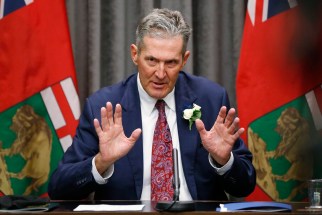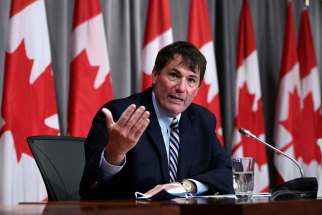Good reason for another trip to Ottawa
Read this article for free:
or
Already have an account? Log in here »
To continue reading, please subscribe:
Monthly Digital Subscription
$0 for the first 4 weeks*
- Enjoy unlimited reading on winnipegfreepress.com
- Read the E-Edition, our digital replica newspaper
- Access News Break, our award-winning app
- Play interactive puzzles
*No charge for 4 weeks then price increases to the regular rate of $19.00 plus GST every four weeks. Offer available to new and qualified returning subscribers only. Cancel any time.
Monthly Digital Subscription
$4.75/week*
- Enjoy unlimited reading on winnipegfreepress.com
- Read the E-Edition, our digital replica newspaper
- Access News Break, our award-winning app
- Play interactive puzzles
*Billed as $19 plus GST every four weeks. Cancel any time.
To continue reading, please subscribe:
Add Free Press access to your Brandon Sun subscription for only an additional
$1 for the first 4 weeks*
*Your next subscription payment will increase by $1.00 and you will be charged $16.99 plus GST for four weeks. After four weeks, your payment will increase to $23.99 plus GST every four weeks.
Read unlimited articles for free today:
or
Already have an account? Log in here »
Hey there, time traveller!
This article was published 07/10/2020 (1891 days ago), so information in it may no longer be current.
When faced with a problem that could erode the popularity of their party, politicians often resort to one of two tactics: 1) announce a study of the issue, which buys time and offers the appearance of taking action; or 2) blame the crisis on another level of government.
Manitoba’s Progressive Conservative government has implemented both strategies simultaneously as it faces a high level of public criticism over its inability to reduce the long lineups at sample sites for COVID-19 testing.

Health Minister Cameron Friesen has promised in recent weeks a “stem-to-stern” study of the province’s testing problem. While declining to offer details, he pledged on Monday that testing capacity will increase “in a matter of days” and the number of sample-collection sites will double within “a few weeks.”
His vague assurances are small consolation to the Manitobans who are currently experiencing coronavirus-like symptoms but are being turned away from sample-collection sites because lines are already too long by early afternoon.
There was cause for optimism on Sept. 30 when Health Canada approved a device called ID NOW rapid COVID-19 testing, which can be used in such places as pharmacies, doctors’ offices and walk-in clinics. To operate it, a trained professional inserts a nasal or throat swab into the machine, which within 15 minutes can detect proteins associated with the virus.
The results are not as accurate as the existing COVID-19 tests, but the units would be a welcome addition to Winnipeg’s anti-coronavirus arsenal, especially for people who are unwilling or unable to endure the intolerantly long lineups at the city’s five sampling stations, and for people who are unable to self-isolate for days while awaiting results from the current test process.
The rapid-test devices seemed like a worthwhile investment for Manitoba — but then the politicians got involved.
The province held a press conference to say it wants to buy a “significant” supply of the units from the manufacturer, U.S.-based Abbott Diagnostics, but complained the Canadian government is blocking its plans to buy the equipment. Premier Brian Pallister has written Prime Minister Justin Trudeau, asking the federal government to relieve the U.S. manufacturer of any prohibitions on the sale of the rapid tests to Manitoba.
But the allegation that Ottawa blocked Manitoba’s effort to buy the equipment is untrue, according to federal Intergovernmental Affairs Minister Dominic LeBlanc. He told the Free Press his government hasn’t blocked provinces from buying COVID-19 supplies, and that Ottawa is working with the provinces on bulk purchases. He and Mr. Trudeau only learned of Manitoba’s allegation of federal interference in a phone call from Mr. Pallister.
Different levels of government often dispute matters of responsibility, habitually protecting their turf, but the discussion of whether Manitoba can independently buy rapid tests should rise above such routine jurisdictional disagreements. It’s about letting Manitobans get tested in a prompt manner to slow the COVID-19 spread. It’s a public-health emergency.
The matter demands face-to-face conversation between Mr. Pallister and his federal counterparts. Manitoba’s premier has recently seen fit to visit Ottawa on matters substantially less grave than Manitoba’s current failure to control the potentially lethal virus; in this instance, the situation is sufficiently serious to warrant an immediate east trip to iron out the misunderstanding that is hampering Manitoba’s effort to buy rapid-test units.
Manitobans would be very interested — many of them waiting in lines that are unacceptably long — to hear about the results of his trip.











